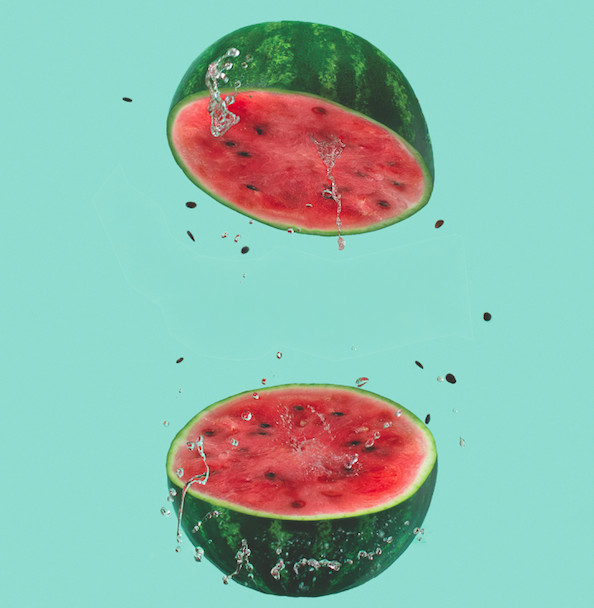
Anistasia Miller and Jared Brown capture the sunshine flavours of melons with some innovative takes on this seasonal fruit favourite.
While Watermelon Martinis and Melon Ball cocktails might be due for a retro resurgence, there’s much more fun to be had with this family of summer flavours.
It’s a bit late to start them now, but if you want to try it next year, growing melons is surprisingly easy. While they need a bit of space for their tendrils to roam, just like their squash and courgette cousins, you can plant them in grow bags and let the melons mature on the ground. Planting seeds into a compost heap is the ideal method: the warmth of decomposition gives them a boost in the spring. Melons love the extra nutrients. And they like growing on a mound – just like squashes and courgettes. There’s a load of different melon varieties to try, but the standards are watermelon, cantaloupe, honeydew and crenshaw.
In the meantime, there are loads of luscious ripe melons in the shops now, begging to be turned into wonderful drinks, from the classic Watermelon Punch in a bowl carved from a watermelon (works magnificently) to the booze-infused watermelon (which never works as well as you would hope unless you’ve got a few days).
Fresh melon liqueurs are absurdly simple. Cut the melon in half. Scoop out the seeds or pick them out of your melon – try using a seedless watermelon for your first experiment. Cut the rind off the melon flesh and discard it. Run the melon through a juicer. Add simple syrup to taste. Our measure is usually one part syrup to three parts melon juice. Measure your mixture and then add an equal amount of distilled spirit. For example, if we make 450ml of melon juice, we add 150ml of simple syrup and then combine it with 600ml gin. You can use vodka, rum, whiskey, aquavit, brandy, tequila, cachaça... there’s really no limit to the possibilities or combinations: watermelon with tequila, cantaloupe with Irish whiskey, honeydew with aquavit.
The resulting liqueur will be cloudy. It will eventually settle. However, you can put it through a fine strainer to clarify it a little. Melon juice does tend to clog coffee filters, but we have had some luck using a very clean coffee press, a cafetière.
If you are not in such a hurry and want a cleaner- looking liqueur, try infusing the melon chunks into the spirit. Combine 250-300g melon chunks with 700ml spirit in a wide-mouthed, lidded jar. Let it sit at least overnight or for two days. Taste it. Strain it out gently. Sweeten to taste with simple syrup.
Preserve and concentrate
Melon shrub is another great way to preserve and concentrate fresh melon flavours. While our recipe calls for watermelon, you can substitute any other melon and use the same recipe. If you have a bumper crop of cucumbers, you can even use this recipe to make a vegetable shrub version.
Cut 500g of fresh watermelon without seeds or rind into chunks. (If you have a juicer, you can juice the watermelon instead.) Place the melon chunks or juice in a mixing bowl. Add 150ml of rice vinegar or white wine vinegar, 100ml of water, 30g of sugar, and 20ml of fresh lemon juice. Press the mixture with a potato masher to crush the melon chunks a bit. Cover the bowl and set aside for at least an hour, preferably for two hours. Strain the mixture through a jelly bag or a cheese cloth laid over a sieve into a clean bowl. Then decant the mixture into a glass bottle and refrigerate.
To serve, put 50ml of shrub into a Collins glass and fill with chilled wheat beer. Or pour 50ml of shrub and 50ml of gin into a Collins glass and fill with sparkling water. Garnish with a sprig of fresh basil.
There are even a few melon-based garnishes you can make. If you have a dehydrator, dried melon slices tend to take about 10-12 hours – at least in our dehydrator. The result should have the texture and flavour of fruit leather underlying an explosion of fresh melon.
Pickled watermelon and pickled watermelon rind chunks are two long-lost recipes from the days when there was far less food waste than there is today. This recipe does not work with melons such as cantaloupe or honeydew, but it’s delicious with watermelons.
Watermelon wine is surprisingly simple and delicious as fruit wines go. There is no added water because the watermelon cooks down to a perfectly watery consistency. There isn’t enough room here to detail step-by-step instructions, but there are plenty available online. One recommendation: use granulated white sugar to preserve the flavour. You can use honey, but you will end up with a watermelon mead. Fruit meads are delicious and have just about the best name ever: ‘melomel’. (This mellow name is only outdone by a traditional Greek liqueur called ‘rakomelo’ and pronounced rock-oh-mellow.) But that’s a subject for another day. In the meantime, bring on the pink, the green, the orange, and the gold of fresh melons for the best flavours of summer.

